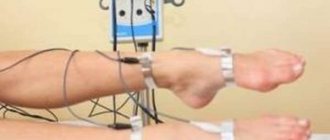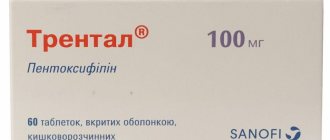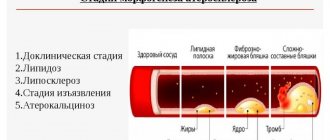Pharmacological properties of the drug Concor cor
Bisoprolol (INN - bisoprololum) is a selective β1-adrenergic receptor blocker. When used in therapeutic doses, it does not have BSA and clinically significant membrane-stabilizing properties. Reduces plasma renin activity, reduces myocardial oxygen demand, and reduces heart rate (at rest and during exercise). By blocking β1-adrenergic receptors of the heart in low doses, it reduces the catecholamine-stimulated formation of cAMP from ACE, reduces the intracellular current of calcium ions, and has a negative chrono-, dromo- and inotropic effect (inhibits conduction excitability, slows down AV conduction). The antianginal effect is due to a decrease in myocardial oxygen demand as a result of a decrease in heart rate, a slight decrease in contractility, prolongation of diastole, and improved myocardial perfusion. When increasing the dose above the therapeutic one, it has a β2-adrenergic blocking effect. Concor Cor has a hypotensive effect due to a decrease in cardiac output, inhibition of renin secretion by the kidneys, as well as an effect on the baroreceptors of the aortic arch and carotid sinus. In case of hypertension (arterial hypertension), the effect occurs after 2–5 days, stable effect occurs after 1–2 months. With prolonged use, bisoprolol reduces increased peripheral vascular resistance. When used in average therapeutic doses, in contrast to non-selective β-blockers, it has a less pronounced effect on organs containing β2-adrenergic receptors (pancreas, skeletal muscles, smooth muscles of peripheral arteries, bronchi and uterus) and on carbohydrate metabolism, does not cause delay sodium ions (Na+) in the body. The severity of the atherogenic effect does not differ from the effect of propranolol. After taking the drug orally, bisoprolol is well absorbed from the gastrointestinal tract. Bioavailability is about 90% and is independent of food intake. The maximum concentration is reached after 1–3 hours. Binding to blood plasma proteins is about 30%. The effect of primary passage through the liver is insignificant (about 10%). About 50% of bisoprolol is biotransformed in the liver with the formation of inactive metabolites. The main metabolites found in blood plasma and urine do not exhibit pharmacological activity. The pharmacokinetics of bisoprolol is linear. Its concentration in blood plasma is proportional to the administered dose in the dose range from 5 to 20 mg. The maximum concentration in blood plasma is reached after 2–3 hours. Bisoprolol is distributed quite widely. The volume of distribution is 3.5 l/kg. Communication with blood plasma proteins is about 35%. The total clearance is 15.6 ± 3.2 l/h, with renal clearance being 9.6 ± 1.6 l/h. The half-life is 10–12 hours. Approximately 98% is excreted from the body in the urine, 50% unchanged, the rest in the form of metabolites, approximately 2% of the dose is excreted in the feces. No dose adjustment is required for patients with mild to moderate hepatic or renal impairment.
Use of the drug Concor cor
The tablets should be taken with a small amount of liquid in the morning before, during or after breakfast. The tablets should not be chewed or crushed into powder. Initiation of treatment for chronic heart failure with Concor Cor requires a special titration phase and regular medical supervision. Treatment of chronic heart failure with Concor Cor begins in accordance with the following titration scheme. Individual adaptation may be required depending on how well the patient tolerates the prescribed dose, i.e. the dose can only be increased if the previous dose was well tolerated.
1st week | 1.25 mg | Concor Cor 1 time per day |
2nd week | 2.5 mg | Concor Cor 1 time per day |
3rd week | 3.75 mg | Concor Cor 1 time per day |
4–7 weeks | 5 mg | Concor 1 time per day |
Week 8–11 | 7.5 mg | Concor 1 time per day |
12th week onwards | 10 mg | Concor 1 time per day as maintenance therapy* |
* To ensure the above dosage regimen, it is recommended to use the drug Concor in subsequent stages of treatment.
The maximum recommended dose for the treatment of chronic heart failure is 10 mg of bisoprolol once a day. Patients are advised to take the dose of the drug selected by the doctor, unless adverse reactions occur. After starting treatment with the drug at a dose of 1.25 mg (1/2 t of Concor Cor tablet), the patient should be observed for about 4 hours (monitoring heart rate, blood pressure, conduction disturbances, signs of worsening heart failure). During or after the titration phase, a temporary worsening of heart failure symptoms, fluid retention, hypotension, or bradycardia may occur. In this case, it is recommended, first of all, to pay attention to the selection of the dosage of concomitant basic therapy (optimize the dose of the diuretic and/or ACE inhibitor) before reducing the dosage of Concor Cor. Treatment with Concor Cor should only be interrupted if absolutely necessary. After stabilization of the patient's condition, re-titration should be carried out, or treatment should be continued. No dose adjustment is usually required for patients with mild to moderate hepatic or renal impairment. For patients with a marked decrease in renal function (creatinine clearance less than 20 ml/min) and with severe liver dysfunction, the daily dose should not exceed 10 mg. In any case, the dose is selected individually. Treatment with Concor Cor is usually long-term. If necessary, treatment can be interrupted and resumed subject to certain rules. Treatment should not be interrupted suddenly, especially in patients with coronary artery disease. If discontinuation of treatment is necessary, the dosage of the drug should be reduced gradually.
Concor - treatment of arterial hypertension and heart rhythm disturbances
Concor is an effective drug for the treatment of diseases of the cardiovascular system.
Treatment of diseases of the cardiovascular system is a big problem. For many conditions, precise selection of drug dosages is required. Therefore, a drug that is convenient for the patient to prescribe and take is very important. Such a drug includes Concor or bisoprolol.
There are receptors in the heart and blood vessels that, when influenced, cause various effects, such as increased heart rate, increased or decreased blood pressure, and others. Concor is a selective beta1-blocker. This type of receptor is located in the heart. If this type of receptor is stimulated, heart rate increases, and the force of contraction also increases, which leads to an increase in the need for nutrients and oxygen in various tissues, in particular the myocardium. In addition, blood pressure increases.
With heart disease, patients experience an increase in blood pressure and an increase in heart rate. A special feature of Concor is its selective blockade of this type of receptor. That is, the drug acts exclusively on beta 1 receptors, without affecting other receptors.
The drug is available in two dosages: 5 and 10 mg. Bisoprolol is synthesized in the form of tablets; there is also an intravenous form, but it is used exclusively in a hospital to obtain a quick effect.
By blocking beta 1 receptors, Concor has:
- hypotensive effect - reduces blood pressure,
- antiarrhythmic - eliminates certain types of rhythm disturbances,
- antianginal - the main mechanism is associated with a decrease in the myocardium's need for oxygen, which is accompanied by improved blood supply, dilation of the blood vessels of the heart, this also leads to a decrease in pain in the heart area.
This drug, unlike others in this group, does not have its own sympathomimetic activity. This means that it only blocks the receptors without causing them to be stimulated at the same time. In addition, it slightly stimulates beta 2 adrenergic receptors without causing significant effects. Beta 2 receptors are located mainly in the bronchi, and when stimulated, they can affect the bronchi, causing many side effects.
Already 3 hours after absorption, the drug has its maximum effect. In some conditions, it is enough to prescribe the drug once, and the effect lasts throughout the day. When analyzing blood pressure after administration of the drug, the greatest effect is observed at the end of the second week of taking the drug.
90% of the active substance of the drug is absorbed into the blood after oral administration. Food and water do not affect the amount of drug absorption.
The main metabolic pathway of concor is oxidative. All metabolites formed in this process are excreted through the kidneys. At the same time, the formed substances are inactive.
Various experiments have shown that CYP3A4 (most of the drug) and CYP2D6 are involved in inactivation.
Concor is prescribed for high blood pressure, myocardial ischemia (stable angina), as well as long-term heart failure. Since this drug is prescribed only by a doctor, he takes into account the patient’s contraindications.
The main contraindications for use are decompensated conditions of cardiovascular diseases: acute heart failure, cardiogenic shock, severe life-threatening arrhythmias (AV block, sick sinus syndrome, sinoatrial block). In addition, given the possible effect on other adrenergic receptors in severe bronchial asthma, Concor is also contraindicated.
In addition to contraindications, it is necessary to remember that Concor can affect many chronic diseases, such as diabetes mellitus, kidney and liver dysfunction, psoriasis, structural disorders of the heart (cardiomyopathy, heart defects).
When taking Concor during pregnancy, you must remember that it affects the blood supply to the placenta, which can cause various pathologies in the fetus. Concor should not be taken while breastfeeding.
Taking the drug can cause various side effects. The most common effects include dizziness, fatigue, and hearing problems. The most pronounced effects are on the functioning of the heart and blood vessels: a decrease in heart rate. If the patient had signs of chronic heart failure, then its manifestations may worsen. In addition, vomiting, nausea, and muscle weakness may occur.
Considering that the treatment of cardiovascular diseases is complex and the patient needs to take a fairly large number of medications, the attending physician must know with which medications Concor can be taken. Particular caution should be taken when taking the medicine with all other antiarrhythmics, medications that affect the functioning of the heart and blood vessels, since their effect can be additive and lead to worsening arrhythmias and an excessive decrease in blood pressure. Also, we must not forget about abrupt withdrawal of the drug. In this case, severe rebound arterial hypotension may occur.
The drug is usually taken in the morning or once during the day. The dosage of the drug is determined only by the attending physician, who will prescribe the medicine based on clinical data and laboratory tests. Most often, the drug is prescribed with 5 mg 1 time. Next, you need to assess the level of blood pressure reduction and, if necessary, increase the dosage. For concomitant diseases of the heart and blood vessels, the dose of the drug can be further reduced to 1.25 mg with a subsequent increase in dosage. Usually the dose is increased once a week.
In some cases, it will be necessary to adjust the doses of other medications. Most often, concor is prescribed for a long period.
If the dose of the drug is chosen incorrectly, signs of overdose may occur. Usually they will manifest themselves as disturbances in the functioning of the heart.
In this case, treatment will be carried out symptomatically, that is, depending on the individual symptoms. If a sharp and marked decrease in heart rate is observed, atropine may be required. With a pronounced decrease in blood pressure, the administration of various solutions or drugs that constrict blood vessels is required.
Only a doctor can change the dosage, since if the dosage is incorrect, the condition may worsen.
Thus, Concor is the optimal remedy in the fight against various diseases of the heart and blood vessels, having a selective effect on their receptors.
concorrection of arterial hypertension and treatment of cardiac arrhythmias
Contraindications to the use of Concor Cor
Hypersensitivity to bisoprolol or any of the components of the drug and other beta-adrenergic receptor blockers; shock (cardiogenic shock), collapse; AV blockade II–III degree, sick sinus syndrome, severe sinoatrial block, bradycardia (heart rate ≤50 beats/min), Prinzmetal angina; arterial hypotension (systolic blood pressure ≤90 mm Hg), history of severe forms of asthma and COPD; late stages of peripheral circulatory disorders, Raynaud's disease; simultaneous use of MAO inhibitors (except for MAO type B inhibitors), psoriasis (including family history), pheochromocytoma, pregnancy and lactation.
special instructions
In some cases, there are no direct contraindications to the use of Concor. However, it should be taken with caution if you have the following disorders:
- following a strict diet (for example, after surgery, to correct weight);
- psoriasis;
- diabetes mellitus (if its course is accompanied by hypoglycemia);
- Prinzmetal's angina;
- AV block (first degree).
Side effects of the drug Concor cor
From the nervous system: increased fatigue, dizziness, headache, sleep disturbances, depression may be observed (especially at the beginning of therapy), rarely - hallucinations (usually mild and disappear within 1-2 weeks), sometimes - paresthesia. On the part of the organ of vision: visual disturbances, decreased tear production (must be taken into account when wearing contact lenses), conjunctivitis. From the cardiovascular system: in some cases - orthostatic hypotension, bradycardia, AV conduction disturbances, decompensation of heart failure with the development of peripheral edema, at the beginning of treatment - deterioration of the condition of patients with intermittent claudication or Raynaud's syndrome. From the respiratory system: in isolated cases - shortness of breath (in patients prone to bronchospasm). From the gastrointestinal tract : in some cases - diarrhea, constipation, nausea, abdominal pain, increased activity of liver enzymes in the blood serum (AST, ALT), hepatitis. From the musculoskeletal system: in some cases - muscle weakness, cramps, arthropathy affecting one or more joints (mono- or polyarthritis). From the endocrine system: decreased glucose tolerance (with latent diabetes mellitus) and masking of signs of hypoglycemia, in some cases - increased TG levels in the blood, potency disorders. On the skin: sometimes - itching, skin hyperemia, increased sweating, rash. When treated with beta-adrenergic receptor blockers, hair loss, hearing impairment or tinnitus, weight gain, mood changes, short-term memory loss, allergic rhinitis, and priapism are observed in some cases.
Special instructions for the use of the drug Concor cor
Concor Cor should not be used during pregnancy and breastfeeding due to the lack of reliable clinical data confirming the safety of the drug. During pregnancy, Concor Cor should only be recommended if the benefit to the mother outweighs the risk of side effects to the fetus. In exceptional cases, the use of bisoprolol during pregnancy should be discontinued 72 hours before the expected due date due to the possibility of bradycardia, hypoglycemia and respiratory depression in the newborn. If discontinuation of the drug is not possible, then after birth the newborn should be under medical supervision. Symptoms of hypoglycemia may occur during the first 3 days. In some cases, beta-adrenergic receptor blockers may cause the development or exacerbation of psoriasis. In patients taking β-adrenergic blockers, due to weakened adrenergic feedback regulation, anaphylactic reactions may be more severe. Due to the individual nature of reactions to the drug, the ability to drive vehicles or operate machinery may be reduced. To a greater extent, this applies to the initial stage of treatment and changes in the dose of the drug, as well as with the simultaneous use of alcohol. There are no clinical data on the effectiveness and safety of Concor Cor in children.
Description of tablets "Concor"
"Concor" is a medication that is used to treat low blood pressure, sore throat, and also to normalize heart rhythm. The active ingredient is 2 compounds:
- Bisoprolol fumarate.
- Bisoprolol hemifumarate.
Available in the form of tablets, each of which contains 5 or 10 mg of the main component. Dispensed in pharmacies only with a prescription. Can be stored under normal conditions (at a temperature not exceeding 30 degrees) for the total shelf life (5 years from the date of production).
Interactions of the drug Concor cor
With simultaneous use, Concor Cor may enhance the effect of antihypertensive drugs. With the simultaneous use of bisoprolol and reserpine, methyldopa, clonidine or guanfacine, a sharp decrease in heart rate is possible. When Concor Cor is used together with clonidine, digitalis preparations, and guanfacine, cardiac conduction disorders may develop. When Concor is used together with verapamil or diltiazem and other antiarrhythmic drugs, a decrease in blood pressure is possible, and the risk of developing or worsening bradycardia, AV block, cardiac arrest and heart failure increases (IV administration of calcium channel blockers and antiarrhythmic drugs during Concor therapy should be avoided Cor).Nifedipine can lead to a significant decrease in blood pressure. Phenytoin with intravenous administration and drugs for inhalation general anesthesia (hydrocarbon derivatives) increase the severity of the cardiodepressive effect and the likelihood of a decrease in blood pressure when used while taking bisoprolol. The effectiveness of insulin and oral hypoglycemic drugs may change during treatment with Concor Cor (masks the symptoms of developing hypoglycemia: tachycardia, increased blood pressure). The clearance of lidocaine and xanthines may decrease due to a possible increase in their concentration in the blood plasma, especially in patients with an initially increased clearance of theophylline under the influence of smoking. NSAIDs, corticosteroids and estrogens weaken the hypotensive effect of bisoprolol (Na+ retention, blockade of prostaglandin synthesis by the kidneys). With the simultaneous use of Concor Cor and sympathomimetics (including cough suppressants, eye drops and nasal drops), the effect of bisoprolol may be weakened. Diuretics, clonidine, sympatholytics, hydralazine and other antihypertensive drugs can lead to an excessive decrease in blood pressure. The effect of non-depolarizing muscle relaxants and the anticoagulant effect of coumarins may be prolonged during treatment with bisoprolol. Tri- and tetracyclic antidepressants, antipsychotics (neuroleptics), ethanol, sedatives and hypnotics increase CNS depression. Concomitant use with MAO inhibitors is not recommended due to a significant increase in the hypotensive effect. The treatment break between taking MAO inhibitors and bisoprolol should be at least 14 days. Non-hydrogenated ergot alkaloids increase the risk of developing peripheral circulatory disorders. Ergotamine increases the risk of developing peripheral circulatory disorders; sulfasalazine increases the concentration of bisoprolol in the blood plasma; Rifampin shortens the half-life. With the simultaneous use of ergotamine derivatives (including ergotamine-containing migraine drugs) and Concor Cor, the severity of peripheral circulatory disorders may increase. With the simultaneous use of Concor Cor and rifampicin, the half-life of bisoprolol may slightly decrease (increasing the dose of Concor is usually not required).
Drug interactions
The drug is not recommended to be combined with medications such as Bisopropol. It leads to a decrease in the conductivity and contractility of the heart, which can lead to bradycardia. In turn, this will lead to vasodilation.
With caution, Concor is combined with drugs based on amiodarone and parasympathomimetic agents. If you use hypoglycemic drugs, their effect will increase. If used together with cardiac glycosides, symptoms of bradycardia will appear.
Parallel use of adrenergic agonists leads to an increase in blood pressure. If you use Mefloquine at the same time, this will again cause symptoms of bradycardia.
Overdose of Concor Cor, symptoms and treatment
Symptoms: arrhythmia, ventricular extrasystole, severe bradycardia, AV block, marked decrease in blood pressure, acute heart failure, hypoglycemia, acrocyanosis, difficulty breathing, bronchospasm, dizziness, fainting, convulsions. Treatment: gastric lavage and administration of adsorbent drugs; symptomatic therapy: in case of developed AV block, intravenous administration of 1–2 mg of atropine, epinephrine or placement of a temporary pacemaker; for ventricular extrasystole - lidocaine (class IA drugs are not used); with a pronounced decrease in blood pressure, the patient should be in a position with the foot end of the bed raised; if there are no signs of pulmonary edema - intravenous plasma replacement solutions; if ineffective - administration of epinephrine, dopamine, dobutamine (to maintain chronotropic and inotropic effects and eliminate the pronounced decrease in blood pressure); for heart failure - cardiac glycosides, diuretics, glucagon; for convulsions - intravenous diazepam; for bronchospasm - β2-adrenergic stimulants by inhalation.








